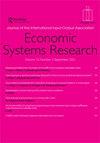Who bears the indirect costs of flood risk? An economy-wide assessment of different insurance systems in Europe under climate change
IF 1.6
4区 经济学
Q2 ECONOMICS
引用次数: 0
Abstract
Anticipated increase in future river flood risk highlights the need for effective flood insurance, as it enables hedging against this risk. However, its design varies significantly across countries. This study contributes to the debate on designing flood insurance mechanisms from an economy-wide perspective, considering both socioeconomic and climate changes. We apply a multi-regional computable general equilibrium (CGE) model for 2050 and find that, under current insurance market systems, flood risk causes regional GDP losses of up to −0.5%, societal welfare losses of up to −1%, and private and public consumption losses of up to −0.5% and −2.4%, respectively. These estimates are all relative to a scenario without flood risk. Our results indicate that flood risk intensifies pressure on public budgets. We find that insurance market reforms, including a higher degree of risk-sharing, mandatory purchase requirements, and public reinsurance, can alleviate adverse welfare effects and the burden on public budgets.谁来承担洪水风险的间接成本?气候变化下欧洲不同保险制度的经济评估
预计未来河流洪水风险的增加凸显了有效的洪水保险的必要性,因为它可以对冲这种风险。然而,不同国家的设计差异很大。本研究有助于从经济角度设计洪水保险机制的讨论,同时考虑社会经济和气候变化。我们应用2050年的多区域可计算一般均衡(CGE)模型发现,在当前的保险市场体系下,洪水风险导致地区GDP损失高达- 0.5%,社会福利损失高达- 1%,私人和公共消费损失分别高达- 0.5%和- 2.4%。这些估计都是相对于没有洪水风险的情况。我们的研究结果表明,洪水风险加剧了公共预算的压力。我们发现,保险市场改革,包括更高程度的风险分担、强制性购买要求和公共再保险,可以减轻不利的福利影响和公共预算负担。
本文章由计算机程序翻译,如有差异,请以英文原文为准。
求助全文
约1分钟内获得全文
求助全文
来源期刊

Economic Systems Research
ECONOMICS-
CiteScore
5.60
自引率
4.00%
发文量
17
期刊介绍:
Economic Systems Research is a double blind peer-reviewed scientific journal dedicated to the furtherance of theoretical and factual knowledge about economic systems, structures and processes, and their change through time and space, at the subnational, national and international level. The journal contains sensible, matter-of-fact tools and data for modelling, policy analysis, planning and decision making in large economic environments. It promotes understanding in economic thinking and between theoretical schools of East and West, North and South.
 求助内容:
求助内容: 应助结果提醒方式:
应助结果提醒方式:


